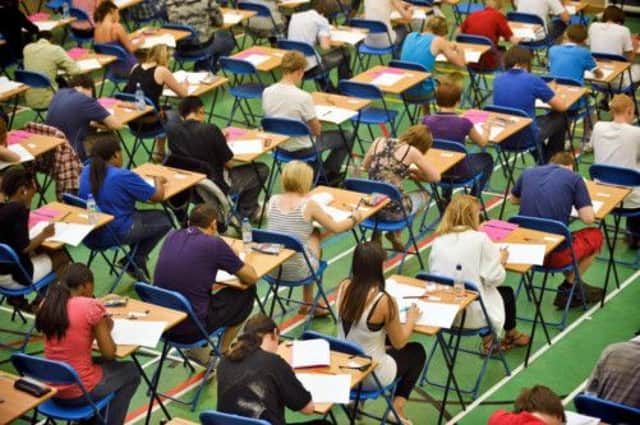Exam passes given to pupils with scores of just 33%


National test results last week showed a rise to a record high pass rate of 98.9 per cent for Standard Grades and 77.4 per cent for Highers.
A breakdown of results published yesterday has now shown that Standard Grade passes were possible for scoring 33 per cent in one of the two components for Spanish.
Advertisement
Hide AdAdvertisement
Hide AdThey were also given for scoring 34 per cent in graphic communication, 35 per cent in French and 38 per cent for maths and geography.
Passes were also handed to some candidates who scored fewer than half marks in a number of Higher subjects.
The C level pass mark for physics was 44 per cent this year and 42 per cent for human biology (revised) and for technological studies.
It was 45 per cent for maths, for care and for drama; 46 per cent for media studies; 47 per cent for chemistry; and 48 per cent for biology and economics.
The SQA has insisted that “there is no lowering of standards” and highlighted the fact that pupils achieving such results would only gain a Foundation pass in Standard Grade rather than the General or Credit award, and a low pass at Higher.
Pupils taking Higher exams would also still have to achieve in the region of 70 per cent for an A and between 75 and 80 per cent for an Upper A.
Liz Smith MSP, the Scottish Conservative education spokeswoman, said she also shared concerns about Scotland’s “ever increasing pass rates”.
She highlighted evidence given to the Scottish Parliament from employers which claimed that young people are leaving school without the necessary skills in numeracy and literacy.
Advertisement
Hide AdAdvertisement
Hide AdShe said: “If we can marry the best part of the Curriculum for Excellence with traditional rigour on testing we ought to do better in future, but at the moment there is not enough proof that we are improving.”
Chris McGovern, a former headteacher who chairs the Campaign for Real Education, told The Scotsman: “There is the very real possibility that employers abroad will look rather dimly on qualifications from a system which allows pupils to pass at such low levels.
“We’re not rubbishing what pupils have achieved here, but it is a betrayal to suggest to pupils that you can pass with 30-odd per cent.
“They need a decent exam and the support to pass it. The new National Qualifications could be even worse as it’s almost all course work to be assessed by teachers.”
He added: “Teachers will be privately very concerned about passes for very low grades, but I dare say afraid to speak out.”
David Watt, executive director at the Institute of Directors in Scotland, said rewards for poor results were not helpful.
He added: “I am pretty confident about our young people but my concern is that the system is not helping them and is giving them unreal accreditations – nor is it helpful to employers.”
Exam chiefs were criticised in June for setting what former examiners claimed was the easiest maths exam to date.
Advertisement
Hide AdAdvertisement
Hide AdClive Chambers, a former principal examiner, said the 2013 maths test was the easiest he had seen. He said it was “a poor-quality paper and it was clear it had been dumbed down compared to previous years”.
Despite the claims, the pass rate for Higher maths fell.
An SQA spokesman said last night: “The increased pass rates in 2013 shows that candidates are succeeding and achieving their potential at all levels, from Access to Advanced Higher by meeting the standard required for the level and grade of the courses they have taken.
“This is testament to their hard work and commitment.”
Grade Checks
THE Scottish Qualifications Authority insists it has a “very robust set of mechanisms” in place to ensure qualifications are designed to present a similar challenge for candidates each year.
The post-exam process of checks and balances, known as the grade boundaries system, is intended to ensure candidates are treated fairly.
A candidate achieving a specific grade is rewarded in the same way as a candidate working at the same ability level in previous years.
For example, analysis of Higher Maths 2013 suggested that it was at a slightly higher level of difficulty for Grade C candidates than it had been in 2012 so the grade boundary for C was lowered slightly.